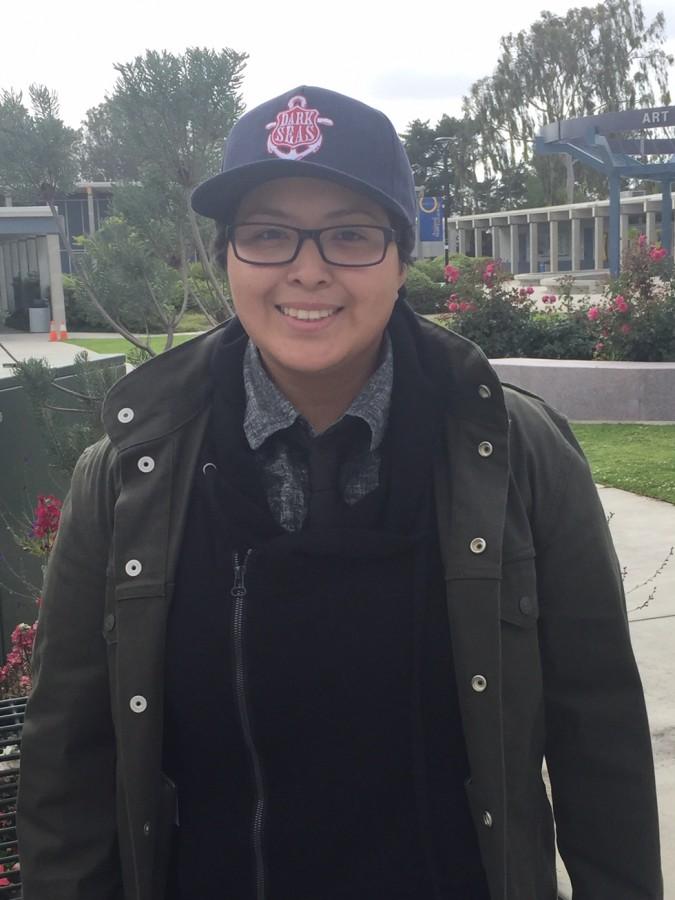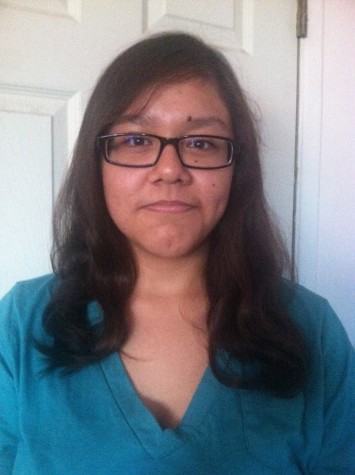What is your major and what process did you go through with choosing it?
I’m actually a double major in psychology and ethnic studies. It was a very long, grueling process of figuring out like what I wanted to do. Years back, from high school I went to Cal State, Northridge and my major was psychology and I worked full-time and so I kind of lost interest in it and then when I moved to San Diego I had to take a Chicano Studies class because it was like the only thing available and I registered late and it sucked and I hated it, to be perfectly honest. I ended up taking La Chicana actually and it was the first exposure that I had to really a class that was ethnically speaking, you know, and kind of more so like a reflection especially that class ’cause it was a feminist Chicana class so it was more of just kind of shedding light on a ton of issues that I had known but you don’t really pay attention to them. Basically I totally fell in love with the class and then decided that I want to emphasize on neuroscience. I love that part of it where, you know, like the putting to pieces and kind of knowing why your brain works the way that it works and just really have the connectivity of that. I also love the social aspect of it. I’m a very social person and I like seeing how different things kind of socially build people in this society so I don’t know exactly how I’m going to mesh them but I’m going to.
When you first began attending Mesa College, did you plan on joining a club? Was there a turning point in your academic career that opened your eyes to joining MEChA?
When I went to Cal State, Northridge I wasn’t involved, I was a commuter and so I remember I had to take the bus like two and a half hours just to get to class. So the last thing that I wanted to do was be on campus all the time. I learned a lot about myself in that I didn’t ask for help and I didn’t find the resources available to me. And so when I came here, I moved to San Diego for school, and I really wanted to be involved and kind of come out of my shell in a sense of like it’s OK to ask for help. I think coming here and really seeing the difference and being so interested in ethnic studies, MEChA just seemed like the right choice at that point.
What does MEChA teach its members? Should individuals be interested in joining MEChA?
Absolutely. I think that MEChA, some MEChA above all, teaches a sense of community. I think that was one of the main things and as president it was one of my main goals for this semester to really get us to be a sense of community and really have a safe space, to be able to explore different options and see different people of ethnic backgrounds being in positions of power and being able to say “Hey you know what, I’m going to pursue communications or psychology or medicine” or whatever and feel like you have a support system. So it’s definitely like that safe space and it also teaches to really take ownership for who you are and teaches you responsibility and really the real life practices of you have to juggle and take responsibility and be an active part of the community and that membership. As well as knowing that there is a balance between work and school and clubs and different things like that. I do think that joining a club is important, I think that finding your resources are very important. I think if anybody is interested in MEChA, the doors are always open and it’s all inclusive and a safe space for everybody but I would definitely encourage Mesa students to weigh their options and find something that’s in their interests and maybe go for something like that.
What were the steps you had to take to become MEChA president? What is expected from you as president?
Everything is expected of me. To be honest, it is a little complicated. What happened is a lot of the students that were an active part of MEChA when I first joined, transferred or they took different life courses. It was really a matter of keeping it going and I kind of fell into the position where nobody else really was in the capacity to really step up and take that leadership. Me, along with other students, like we definitely kind of sat down and were just like “OK, are we going to keep it going? Or what’s going to happen?” and I honestly just kind of happened to become the president. A lot is expected of me, from the professors, from our advisors, from the school itself, from its members as well. We hope MEChA to be a collective and we hold ourselves to be a collective where everybody carries their own weight. There’s not just one person in charge. But definitely there is an amount of stress that goes with being president and having that still on your shoulders even though I’m not the only one making decisions for MEChA.
What do you plan on doing once you graduate from Mesa? Do you think you’ll continue to be active in MEChA programs throughout your academic career?
I hope so. When I graduate from Mesa, I hope to transfer and then I hope to get my Bachelor’s and then my Master’s and then hopefully my PhD. I definitely want to do research and teach. So I want to become a professor. And I do think that being part of MEChA and other ethnically charged groups are definitely going to help me get to my goals. So yes and no. I would say that I would look forward to being part of organizations like MEChA that are student led organizations for ethnic people.


